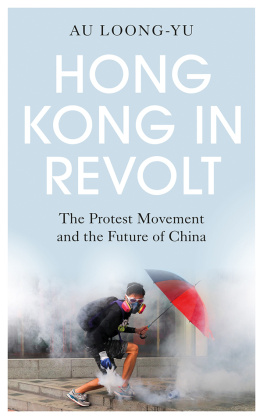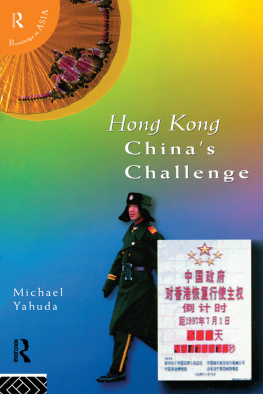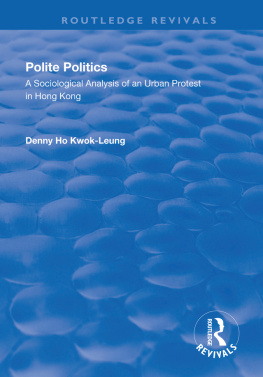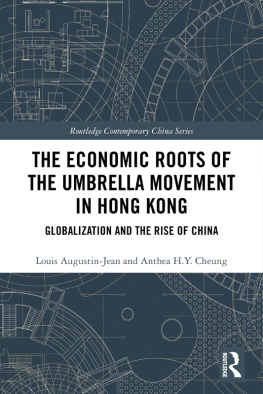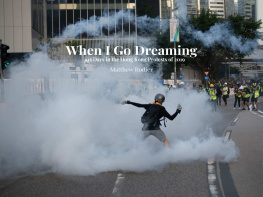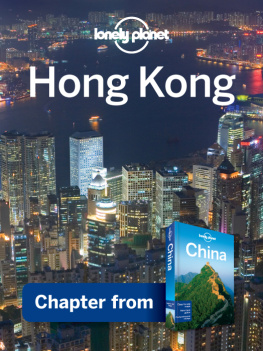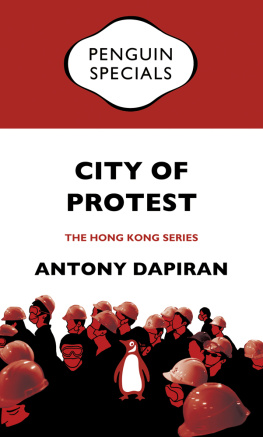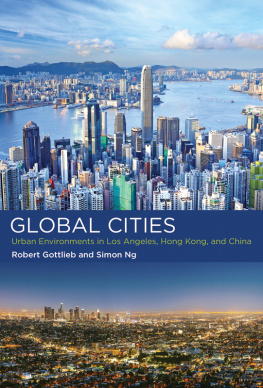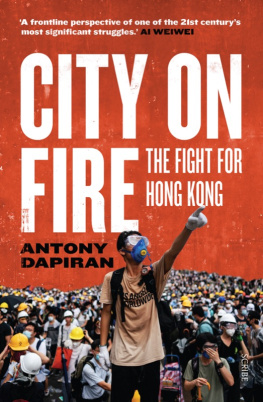Au Loong-Yu - Hong Kong in Revolt: The Protest Movement and the Future of China
Here you can read online Au Loong-Yu - Hong Kong in Revolt: The Protest Movement and the Future of China full text of the book (entire story) in english for free. Download pdf and epub, get meaning, cover and reviews about this ebook. year: 2020, publisher: Book Network Intl Limited trading as NBN International (NBNi), genre: Politics. Description of the work, (preface) as well as reviews are available. Best literature library LitArk.com created for fans of good reading and offers a wide selection of genres:
Romance novel
Science fiction
Adventure
Detective
Science
History
Home and family
Prose
Art
Politics
Computer
Non-fiction
Religion
Business
Children
Humor
Choose a favorite category and find really read worthwhile books. Enjoy immersion in the world of imagination, feel the emotions of the characters or learn something new for yourself, make an fascinating discovery.
- Book:Hong Kong in Revolt: The Protest Movement and the Future of China
- Author:
- Publisher:Book Network Intl Limited trading as NBN International (NBNi)
- Genre:
- Year:2020
- Rating:5 / 5
- Favourites:Add to favourites
- Your mark:
- 100
- 1
- 2
- 3
- 4
- 5
Hong Kong in Revolt: The Protest Movement and the Future of China: summary, description and annotation
We offer to read an annotation, description, summary or preface (depends on what the author of the book "Hong Kong in Revolt: The Protest Movement and the Future of China" wrote himself). If you haven't found the necessary information about the book — write in the comments, we will try to find it.
Au Loong-Yu: author's other books
Who wrote Hong Kong in Revolt: The Protest Movement and the Future of China? Find out the surname, the name of the author of the book and a list of all author's works by series.
Hong Kong in Revolt: The Protest Movement and the Future of China — read online for free the complete book (whole text) full work
Below is the text of the book, divided by pages. System saving the place of the last page read, allows you to conveniently read the book "Hong Kong in Revolt: The Protest Movement and the Future of China" online for free, without having to search again every time where you left off. Put a bookmark, and you can go to the page where you finished reading at any time.
Font size:
Interval:
Bookmark:

Hong Kong in Revolt
in Revolt
The Protest Movement
and the Future of China
Au Loong-Yu

First published 2020 by Pluto Press
345 Archway Road, London N6 5AA
www.plutobooks.com
Copyright Au Loong-Yu 2020
The right of Au Loong-Yu to be identified as the author of this work has been asserted in accordance with the Copyright, Designs and Patents Act 1988.
British Library Cataloguing in Publication Data
A catalogue record for this book is available from the British Library
ISBN 978 0 7453 4145 3 Hardback
ISBN 978 0 7453 4146 0 Paperback
ISBN 978 1 7868 0677 2 PDF eBook
ISBN 978 1 7868 0679 6 Kindle eBook
ISBN 978 1 7868 0678 9 EPUB eBook
Typeset by Stanford DTP Services, Northampton, England
I would like to express my deep gratitude to Rachel Page, who read the whole manuscript and gave valuable advice. I would also like to thank Promise Li, Wong Hon Tung, and C.N. for reading part of the manuscript and helping to improve it. Last but not least, I would like to thank the 1997 generation, who had both the sensitivity and the courage to stand up for the Hong Kong people and to claim back what is owed to them.
At the last stage of copy-editing this book, Beijing made another offensive against Hong Kong by tabling a draft bill intended to impose its will on the national security law of Hong Kong. This is no less than a statement pronouncing the death of Hong Kongs autonomy. This action has raised the already brewing ChinaUS global contest to a new level. Upon advice from the editors, I have added a section on this issue in the final chapter. While I was writing it, a huge protest wave, in solidarity with George Floyd who was killed by the police, was sweeping across the US. The issue is much debated in both Hong Kong and mainland China. With all these new events breaking out one after the other, like it or not, the world will never be the same.
Au Loong-yu
5 June 2020
Hong Kong
As I write these lines, the Chinese government in Beijing has launched a new round of offensives against Hong Kongs autonomy. On 17 April 2020, both Beijings Hong Kong Liaison Office and Hong Kong and Macau Affairs Office (HKMAO) reinterpreted the Basic Law of Hong Kong and argued that they have the right to exercise supervision over Hong Kongs affairs, despite Article 22 of the Basic Law, which states the opposite. This is not just a war of words. The Liaison Office said what it did because it had already mounted a forceful attack on Dennis Kwok, the pan-democrat lawmaker, for obstructing the tabling of a bill criminalising disrespect of the Chinese national anthem. Kwok reminded Beijing that it is bound by Article 22. The two offices openly replied, no, we arent. On top of this, the Hong Kong government is widely believed to have acted under instruction from Beijing when it arrested fifteen of the most well-known pan-democrat politicians for illegal assembly on 18 April 2020. Although the pan-democrat parties did not lead the 2019 Hong Kong Revolt no party did Beijing still considers them to be culprits in light of their sympathy with the protests. In general, these are acts of revenge for this revolt the biggest ever in Hong Kong. Two million protesters took to the streets, a great political general strike took place, masked protesters repeatedly and intensively fought with the police, and eventually the Hong Kong and Beijing governments were humiliated and forced to withdraw the hated extradition bill (see ).
In October 2019, when I first began seriously thinking about how to write this book, the movement had reached a critical juncture as the second and third general strike calls had failed to mobilise workers. Beijing and the Cathay Pacific airline had retaliated against the most militant sector of strikers, the aviation industry workers, by firing dozens of them. At that time, I wrote that it was unlikely that the next strike would be successful and that the movement might enter into decline after a period of stalemate. I did not expect that the failure to achieve another strike would be overcome by the brave young generation, who took on the government with even more intensive street fighting, culminating in the occupation of two major universities in Hong Kong, and followed by heavy clashes between occupiers and the riot police. The youth could not bear the pain of only having yet achieved one of their five demands, and so they continued to fight. They were eventually defeated. Yet this setback was again overcome by the overwhelming victory of the opposition in the ensuing District Council elections, followed by another million protesters taking to the streets for the New Years Day march in 2020. This was the second time that Hong Kongers had successfully defeated Beijings attempt to table a bill aimed at destroying their liberties and civil rights, after the 2003 protests that obviated the introduction of the National Security (Legislative Provisions) Bill by Beijing. Hong Kong is no longer just a goose that lays golden eggs. For the first time its people have made the whole world listen, not as a goose, or what protesters themselves jokingly called gong zyu (Hong Kong pigs, who only focus on making money and have no interest in participating in public affairs), but as millions of living, kicking human beings who aspire to freedom.
The local people called their protest the anti-China extradition bill movement. Some considered the movement to be practically anti-China, or even anti-Chinese, while others thought that it was just anti-Chinese Communist Party (CCP). But let us not forget that the five demands, which include the demand for universal suffrage, were what unified millions of people in this great revolt. This is not to say that there were no anti-CCP or anti-China elements in the movement. My aim with this book is to reflect as much as possible on the hugely diverse and multi-faceted nature of this movement that lasted for seven months. I am not a neutral observer. I participated in the movement, yelling slogans and joining in civil disobedience, as I did in the 2014 Umbrella Movement. But I have tried to understand the different groups and currents without regard for my own position, because only in this way can one grasp the real dynamics of a movement and ask the right questions about it.
With the outbreak of the Covid-19 pandemic in Wuhan, and its spread to Hong Kong, the writing of this book became more difficult. I had to spend a great deal of time cleaning and stocking up on supplies. I had no idea that soon half of the world would be in the same predicament. With this outbreak, resentment against the Chinese government, or the Chinese, or both, has become stronger, and has quickly gone beyond the citys limits. There is a similar logic behind both Beijings attack on Hong Kongs autonomy and the regimes handling of the Covid-19 pandemic. It first manifested itself in the regimes contempt for the laws they themselves had made. In the first case it practically ignored the Basic Law of Hong Kong, in the second case the Wuhan authorities simply ignored the Law on the Prevention and Control of Infectious Diseases, which contributed to the spreading of the disease. Behind both important events one can identify the same logic of the Chinese bureaucracy, which combines in its hands state coercive power and the power of capital above all other classes, a bureaucracy which is simultaneously committed to industrialisation but also carries strong elements of premodern absolutism. It is a bureaucracy which learned a lot from its Western counterparts in terms of public administration, but it is also one which is permeated with the residues of a premodern political culture, the culture of imperial China. It was no accident that President Xi Jinping, in his report to the Nineteenth Party Congress, stressed passing on our red genes in the great endeavour of making Chinas military strong.
Font size:
Interval:
Bookmark:
Similar books «Hong Kong in Revolt: The Protest Movement and the Future of China»
Look at similar books to Hong Kong in Revolt: The Protest Movement and the Future of China. We have selected literature similar in name and meaning in the hope of providing readers with more options to find new, interesting, not yet read works.
Discussion, reviews of the book Hong Kong in Revolt: The Protest Movement and the Future of China and just readers' own opinions. Leave your comments, write what you think about the work, its meaning or the main characters. Specify what exactly you liked and what you didn't like, and why you think so.

